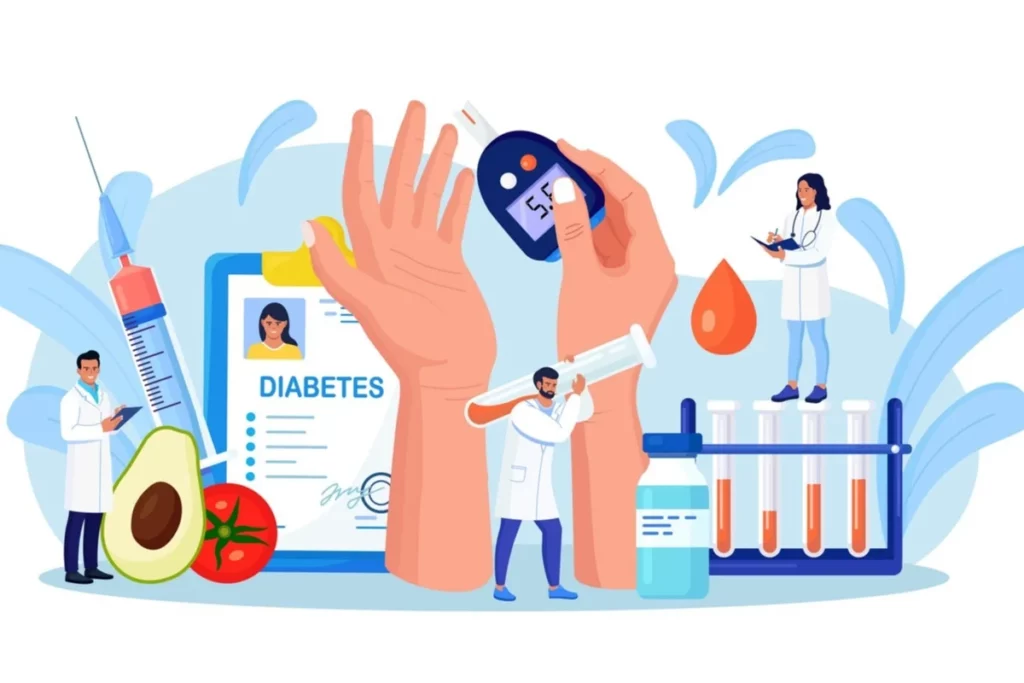Type 1 Diabetes Mellitus is a condition that requires constant attention and management. In this guide, we aim to provide diabetes mellitus type 1 treatment insights and practical advice. Understanding the complexities of this autoimmune disorder is crucial for effective management. We’ll delve into the latest treatment options and lifestyle adjustments that are making life easier for those affected.
Contents
What Is Diabetes Mellitus Type 1?
 Diabetes Mellitus Type 1, often referred to simply as Type 1 Diabetes, is an autoimmune disorder in which the body’s immune system mistakenly attacks and destroys the insulin-producing beta cells in the pancreas. In the absence of sufficient insulin production, glucose accumulates in the bloodstream, leading to elevated blood sugar levels. This condition is characterized by its sudden onset, most commonly in children and young adults, although it can develop at any age.
Diabetes Mellitus Type 1, often referred to simply as Type 1 Diabetes, is an autoimmune disorder in which the body’s immune system mistakenly attacks and destroys the insulin-producing beta cells in the pancreas. In the absence of sufficient insulin production, glucose accumulates in the bloodstream, leading to elevated blood sugar levels. This condition is characterized by its sudden onset, most commonly in children and young adults, although it can develop at any age.
The exact cause of Type 1 Diabetes is still not completely understood. However, it is believed to involve a combination of genetic predisposition and environmental factors that trigger the immune system’s attack on the pancreas. Unlike Type 2 Diabetes, which is often associated with lifestyle factors and is more common in adults, Type 1 Diabetes is not linked to lifestyle or diet. It is a lifelong condition and requires constant management.
What Are The Main Treatments For Type 1 Diabetes Mellitus?
The main treatments for Type 1 Diabetes Mellitus focus on maintaining blood sugar levels as close to normal as possible to prevent complications. Here are the primary medical treatments and some of the latest options in this field:
Insulin Therapy
The cornerstone of diabetes mellitus type 1 treatment is insulin therapy. Treatment involves balancing insulin doses with food intake and physical activity. There are several types of insulin used, including rapid-acting insulin. It is taken before meals to cover the carbohydrates consumed, and long-acting insulin, which provides basal coverage and controls blood glucose levels between meals and overnight. Patients can administer insulin through multiple daily injections, where they use a fine needle and syringe or an insulin pen to inject insulin under the skin. Alternatively, insulin pumps deliver a continuous dose of insulin through a small catheter placed under the skin.
Blood Glucose Monitoring
Traditional blood glucose meters require a finger prick to obtain a small blood sample, which is then placed on a test strip in the meter to get the reading. This method requires multiple tests throughout the day to monitor how different factors like food, activity, and stress affect blood glucose levels. Continuous Glucose Monitors (CGMs) offer a more advanced and convenient option. These devices use a small sensor inserted under the skin to measure glucose levels in the interstitial fluid. They provide real-time glucose readings and trends, allowing for more proactive management of blood sugar levels.
Dietary Management
It involves more than just avoiding sugar; it’s about understanding how different types of food affect blood sugar levels. Carbohydrate counting is a key strategy, as carbohydrates have the most significant impact on blood glucose. Patients learn to calculate the amount of carbohydrates in each meal and adjust their insulin dose accordingly. A balanced diet rich in fruits, vegetables, whole grains, and lean proteins is recommended. Portion control and meal timing also play an essential role in keeping blood glucose levels stable.
Physical Activity
 Regular exercise is important for overall health and particularly beneficial for people with Type 1 Diabetes. It can improve cardiovascular health, reduce stress, and enhance insulin sensitivity, meaning the body uses insulin more effectively. However, managing exercise can be challenging. Because it can lower blood sugar levels both during and hours after the activity. People with Type 1 Diabetes may need to adjust their insulin dose or eat a snack before exercising to prevent hypoglycemia (low blood sugar). The type, duration, and intensity of exercise will affect how one should adjust their insulin and food intake.
Regular exercise is important for overall health and particularly beneficial for people with Type 1 Diabetes. It can improve cardiovascular health, reduce stress, and enhance insulin sensitivity, meaning the body uses insulin more effectively. However, managing exercise can be challenging. Because it can lower blood sugar levels both during and hours after the activity. People with Type 1 Diabetes may need to adjust their insulin dose or eat a snack before exercising to prevent hypoglycemia (low blood sugar). The type, duration, and intensity of exercise will affect how one should adjust their insulin and food intake.
Advanced Insulin Delivery Systems
Closed-Loop Systems/Artificial Pancreas: This technology represents a significant advancement in diabetes management. This combines a continuous glucose monitor (CGM) and an insulin pump with a sophisticated algorithm to automatically adjust insulin delivery based on real-time glucose readings. This system mimics the way a healthy pancreas responds to blood sugar changes. And offering a more hands-off approach to insulin management.
Smart Insulin Pens: For those who prefer or require insulin injections over pumps, smart insulin pens are an innovative option. These pens are equipped with technology to record the time and dosage of each insulin injection. They can sync this data with smartphone apps, allowing users and their healthcare providers to track and analyze insulin usage over time.
Psychological Support
Managing Type 1 Diabetes is not just a physical challenge. Rather, it also involves significant psychological and emotional aspects. The constant monitoring, treatment adjustments, and concern about complications can be stressful and overwhelming. Psychological support, whether in the form of counseling, therapy, or support groups, plays a crucial role in comprehensive diabetes care. Mental health professionals can help individuals cope with the emotional burden of managing a chronic illness, addressing issues like anxiety, depression, and diabetes-related distress.
These treatments require careful coordination and ongoing adjustment, typically overseen by a team of healthcare professionals. It’s important to note that while these treatments manage the condition, there is currently no cure for Type 1 Diabetes.
Lifestyle Changes In Diabetes Mellitus Type 1 Treatment
When managing Type 1 Diabetes Mellitus, lifestyle changes play a crucial role alongside medical treatments. These changes are aimed at maintaining blood sugar levels within a target range and promoting overall well-being. Here are key lifestyle modifications that are often recommended:
Stress Management
High-stress levels can cause blood sugar to rise, while relaxation can help to lower it. Techniques such as mindfulness, meditation, yoga, or deep breathing exercises can be effective in managing stress. It’s also helpful to identify stressors and develop coping strategies, whether through personal methods or with the help of a mental health professional.
Regular Health Check-Ups
Regular visits to a healthcare provider are essential for monitoring the management of Type 1 Diabetes and for screening for potential complications. These check-ups often include reviewing blood glucose logs, A1C testing, cholesterol and blood pressure checks, and eye examinations. Regular dental check-ups are also important as diabetes can increase the risk of gum disease.
Alcohol and Smoking Cessation
Alcohol can affect blood sugar levels, so people with Type 1 Diabetes need to understand how to drink safely. This includes monitoring blood sugar levels closely and being aware of how different types of alcohol can impact these levels. Smoking is particularly harmful to individuals with diabetes, as it increases the risk of complications such as heart disease, stroke, and circulation problems. Quitting smoking is strongly advised, and there are various support systems and programs available to assist with this.
Sleep Hygiene
 Good sleep is essential for overall health and can affect blood sugar levels and insulin sensitivity. People with Type 1 Diabetes should aim for regular sleep patterns and ensure they get enough quality sleep. Poor sleep can affect blood sugar control and increase the risk of complications. Practices to improve sleep include maintaining a regular sleep schedule, creating a comfortable sleep environment, and avoiding caffeine or heavy meals close to bedtime.
Good sleep is essential for overall health and can affect blood sugar levels and insulin sensitivity. People with Type 1 Diabetes should aim for regular sleep patterns and ensure they get enough quality sleep. Poor sleep can affect blood sugar control and increase the risk of complications. Practices to improve sleep include maintaining a regular sleep schedule, creating a comfortable sleep environment, and avoiding caffeine or heavy meals close to bedtime.
Travel Preparation
For individuals with Type 1 Diabetes, traveling requires additional planning. This includes packing enough medication, testing supplies, and snacks to manage blood sugar levels. It’s also important to keep medications and supplies in carry-on luggage to avoid issues with lost baggage. When traveling across time zones, insulin timing may need to be adjusted. And it’s advisable to consult a healthcare provider for specific recommendations.
Education and Awareness
Staying informed about Type 1 Diabetes is crucial. This involves learning about the condition, understanding how different factors affect blood sugar levels, and staying up-to-date with the latest research and treatment options. Educational resources can be found through diabetes clinics, support groups, and reputable online sources.
Emergency Preparedness
Individuals with Type 1 Diabetes should be prepared for potential emergencies, such as severe hypoglycemia. This includes wearing a medical alert bracelet and carrying emergency glucagon kits. It can be used to treat severe low blood sugar. It’s also important to educate family, friends, and colleagues about how to recognize and respond to diabetes emergencies.
These lifestyle changes are integral to the overall treatment and management plan for Type 1 Diabetes and help in reducing the risk of complications, improving quality of life, and maintaining better control over the condition.
Conclusion
In conclusion, Diabetes Mellitus type 1 treatment is a multifaceted journey that combines medical treatments like insulin therapy and blood glucose monitoring with vital lifestyle changes such as stress management, regular health check-ups, and healthy living habits. It’s about finding a balance between medical care and daily life adjustments to maintain optimal blood sugar levels and overall well-being.
With the right approach, individuals with Type 1 Diabetes can lead full, active lives while effectively managing their condition. Remember, while this is a lifelong challenge, it doesn’t have to define your life. Do you want to get rid of diabetes? Join our online diabetes treatment program and reverse Diabetes naturally through lifestyle changes such as a Personalized Diet plan, Exercise, Yoga, dieticians, and health coaches.

